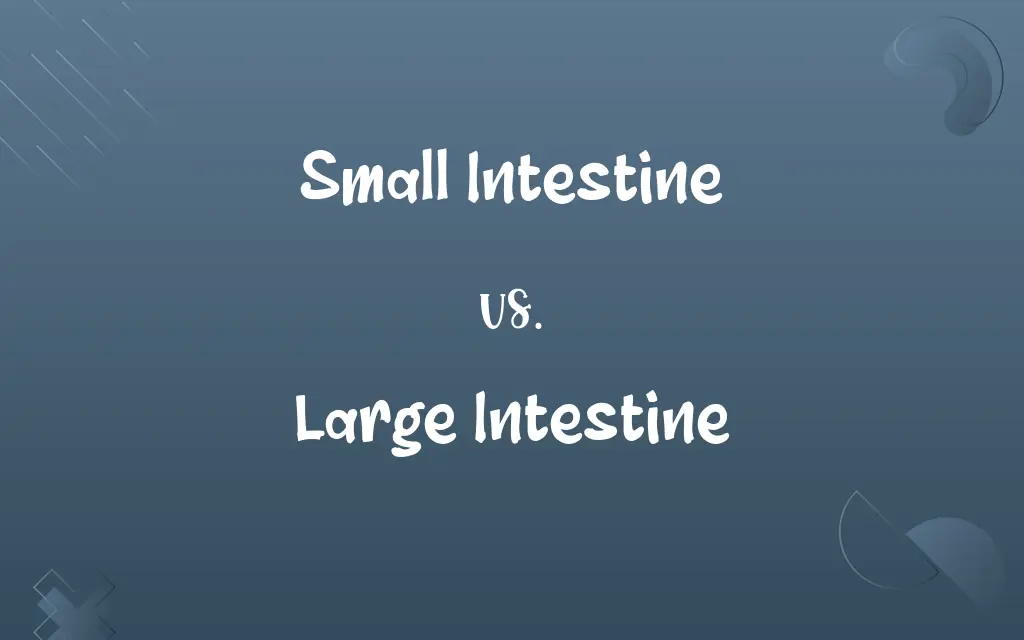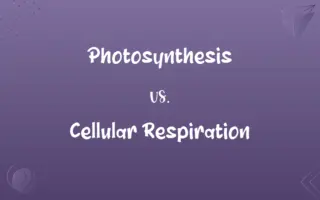Small Intestine vs. Large Intestine: Know the Difference

By Shumaila Saeed || Updated on December 25, 2023
The small intestine is primarily involved in nutrient absorption, while the large intestine absorbs water and forms stool.

Key Differences
The small intestine and the large intestine are key components of the human digestive system, each with distinct functions. The small intestine, a long, narrow tube, is primarily responsible for digesting food and absorbing nutrients. In contrast, the large intestine, which is wider and shorter, primarily absorbs water and electrolytes, preparing waste for elimination.
Shumaila Saeed
Dec 15, 2023
Anatomically, the small intestine is divided into three sections: the duodenum, jejunum, and ileum. It's here that most of the digestion and absorption of nutrients takes place, facilitated by its highly folded surface area. The large intestine consists of the cecum, colon, rectum, and anal canal. Its main role is not in nutrient absorption but in the consolidation and expulsion of fecal matter.
Shumaila Saeed
Dec 15, 2023
In terms of length, the small intestine is significantly longer, measuring about 20 feet, while the large intestine is about 5 feet in length. However, the large intestine is called 'large' because of its wider diameter compared to the small intestine. This difference in size is reflective of their distinct roles in digestion.
Shumaila Saeed
Dec 15, 2023
Microbiota play different roles in each intestine. The small intestine hosts a relatively low number of bacteria due to its acidic environment and rapid transit time. In contrast, the large intestine houses a vast and diverse microbiota, crucial for fermenting undigested material, synthesizing certain vitamins, and forming a key part of the immune system.
Shumaila Saeed
Dec 15, 2023
Comparison Chart
Length in Name
'Small' refers to the narrower diameter.
'Large' denotes its wider diameter.
Shumaila Saeed
Dec 15, 2023
ADVERTISEMENT
Function in Text
Focuses on nutrient absorption.
Concerned with water absorption and stool formation.
Shumaila Saeed
Dec 15, 2023
Medical Terms
Associated with diseases like Crohn's.
Linked to conditions like colorectal cancer.
Shumaila Saeed
Dec 15, 2023
Location in Body
Extends from stomach to large intestine.
Connects to the small intestine, ending at the anus.
Shumaila Saeed
Dec 15, 2023
Small Intestine and Large Intestine Definitions
Small Intestine
The small intestine is a long, coiled organ where most digestion occurs.
Nutrients from your lunch are absorbed in your small intestine.
Shumaila Saeed
Dec 09, 2023
ADVERTISEMENT
Large Intestine
The large intestine houses a significant amount of gut microbiota.
Gut health is greatly influenced by the flora in the large intestine.
Shumaila Saeed
Dec 09, 2023
Small Intestine
It's the narrowest section of the intestine, specialized in nutrient absorption.
Doctors found an obstruction in the patient's small intestine.
Shumaila Saeed
Dec 09, 2023
Large Intestine
The large intestine includes the colon, rectum, and anal canal.
Colonoscopies inspect the health of the large intestine.
Shumaila Saeed
Dec 09, 2023
Small Intestine
The small intestine is crucial for breaking down food into absorbable components.
A healthy small intestine is key to a well-functioning digestive system.
Shumaila Saeed
Dec 09, 2023
Large Intestine
The large intestine is the final section of the digestive tract, primarily involved in water absorption.
Dehydration can affect the large intestine's ability to function.
Shumaila Saeed
Dec 09, 2023
ADVERTISEMENT
Small Intestine
It's distinguished from the large intestine by its smaller diameter.
Despite its name, the small intestine is quite lengthy.
Shumaila Saeed
Dec 09, 2023
Large Intestine
It plays a key role in forming and expelling feces.
Constipation can indicate problems in the large intestine.
Shumaila Saeed
Dec 09, 2023
Small Intestine
Comprises three sections: duodenum, jejunum, and ileum.
The duodenum is the first part of the small intestine.
Shumaila Saeed
Dec 09, 2023
Large Intestine
It's wider but shorter than the small intestine, forming the last part of the digestive system.
The large intestine includes the colon and rectum.
Shumaila Saeed
Dec 09, 2023
Repeatedly Asked Queries
Is the small intestine part of the upper or lower digestive tract?
It's a part of the lower digestive tract.
Shumaila Saeed
Dec 15, 2023
What is the main function of the small intestine?
It primarily digests food and absorbs nutrients.
Shumaila Saeed
Dec 15, 2023
What is the main function of the large intestine?
It absorbs water and forms stool.
Shumaila Saeed
Dec 15, 2023
How long is the large intestine compared to the small intestine?
It's shorter, about 5 feet in length.
Shumaila Saeed
Dec 15, 2023
Does the small intestine have a role in immune function?
Yes, it plays a role in immune function, particularly through its intestinal flora.
Shumaila Saeed
Dec 15, 2023
Is the large intestine essential for digestion?
While it's not essential for digestion, it's crucial for water absorption and waste expulsion.
Shumaila Saeed
Dec 15, 2023
How does the small intestine aid in digestion?
It secretes enzymes and absorbs nutrients from digested food.
Shumaila Saeed
Dec 15, 2023
Can the large intestine be affected by cancer?
Yes, colorectal cancer primarily affects the large intestine.
Shumaila Saeed
Dec 15, 2023
Can you live without a small intestine?
Life without a small intestine is challenging and requires medical interventions.
Shumaila Saeed
Dec 15, 2023
What are common symptoms of small intestine disorders?
Symptoms include abdominal pain, bloating, and nutrient deficiencies.
Shumaila Saeed
Dec 15, 2023
What diseases commonly affect the small intestine?
Conditions like Crohn's disease and celiac disease.
Shumaila Saeed
Dec 15, 2023
Can changes in diet affect the large intestine?
Yes, dietary changes can impact its function and microbiota.
Shumaila Saeed
Dec 15, 2023
Can stress affect the large intestine?
Yes, stress can impact its function, potentially leading to issues like IBS.
Shumaila Saeed
Dec 15, 2023
What role does the large intestine play in gut flora?
It houses a diverse microbiota important for gut health.
Shumaila Saeed
Dec 15, 2023
What's the difference in diameter between the small and large intestines?
The small intestine is narrower, while the large intestine is wider.
Shumaila Saeed
Dec 15, 2023
What happens if the large intestine is removed?
Removal can affect water absorption and stool formation, requiring lifestyle adjustments.
Shumaila Saeed
Dec 15, 2023
Are there any specific diets for a healthy small intestine?
Diets rich in fiber, low in processed foods, and with adequate hydration benefit the small intestine.
Shumaila Saeed
Dec 15, 2023
Why is the small intestine longer than the large intestine?
Its length increases the surface area for nutrient absorption.
Shumaila Saeed
Dec 15, 2023
What's the role of the large intestine in the immune system?
Its gut flora plays a crucial part in the body's immune response.
Shumaila Saeed
Dec 15, 2023
Share this page
Link for your blog / website
HTML
Link to share via messenger
About Author
Written by
Shumaila SaeedShumaila Saeed, an expert content creator with 6 years of experience, specializes in distilling complex topics into easily digestible comparisons, shining a light on the nuances that both inform and educate readers with clarity and accuracy.






































































